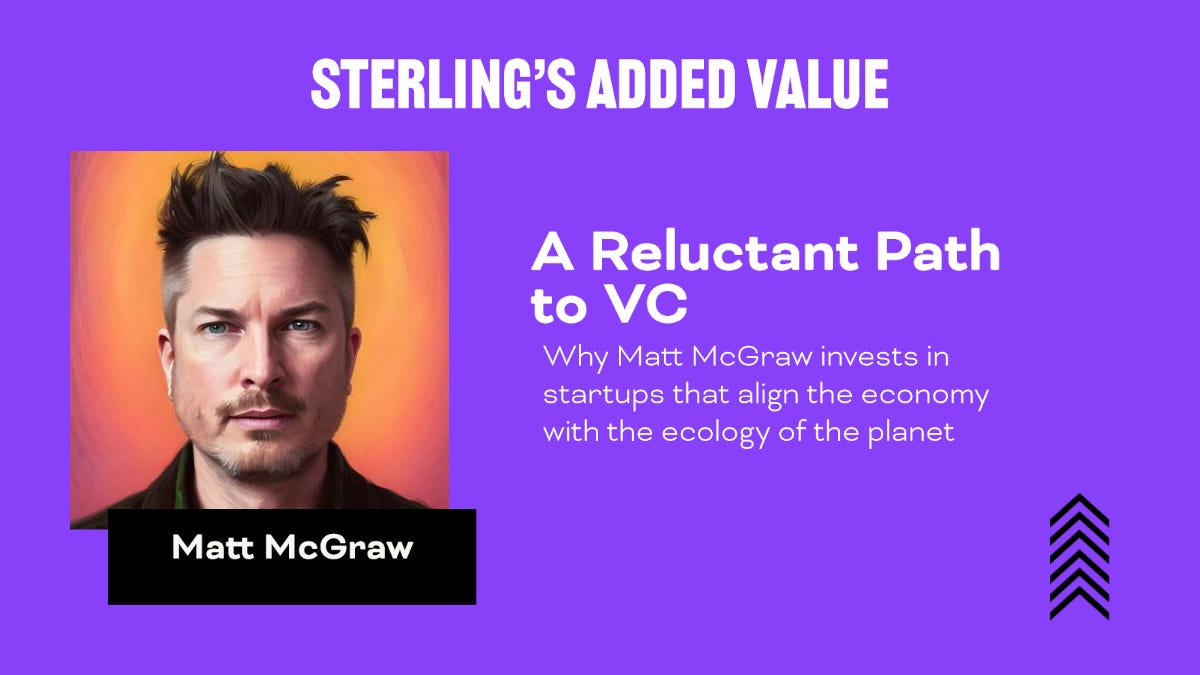A Reluctant Path to VC: Why Matt McGraw Invests in Companies that Align the Economy with the Ecology of the Planet
After nearly 30 years in the tech industry, Matt McGraw now lends his expertise to early stage founders working on hard science startups.
It’s rare to meet a VC who is so reluctant about being a VC.
He may not be reluctant now, but when Matt McGraw was approached by a good friend to start a fund, he had his reservations: “An old white guy and an older white guy start a fund in San Francisco? Bury that on page 700 of The Wall Street Journal, please.”
But sometimes, white guys still bring something to the table beyond capital. He and his partners Jim Boettcher and Alicia Cha Umphreys started Anthropocene Ventures “to back companies that more closely align the economy of the planet with the ecology of the planet in a more equitable way for the people on the planet.”
The Operator Who Scaled Your Favorite Startups
If you can name a successful tech company that started in the late 90s or early 2000s, they likely met Matt.
Soon after moving to the Bay Area, he started his consulting firm Rocket Science. They became a one-stop shop for startups who needed technical expertise and advice so they could scale quickly.
During that time, he worked alongside many VCs as he helped scale their portfolio companies, but he wasn’t very impressed with their ethics. “They didn't care about the people that they were investing in, or the idea even that they were investing in,” he says. “They really just cared whether it was on trend and gonna get a good markup.”
As the tech scene became more and more vapid, he decided it was time to sell the company and be a full-time dad. But he didn’t leave the tech space forever (who does?). He was writing almost 60 angel checks every year for primarily underestimated founders.
As Matt raised his family full-time, his wife continued her studies in climate science. Her passion for sustainability inevitably led her to propose an updated thesis for Matt. “She told me ‘Climate justice and justice are basically overlapping circles, not even a Venn diagram,’” he recalls, “and she told me I should work in climate.”
Although it interested him, Matt was hesitant to describe himself as a climate investor because he felt that he didn’t have anything to offer to climate founders. But his wife kept pitching him on the idea: “She said, ‘You helped pre-seed and seed stage companies scale to exit velocity. You did that for some of the greatest companies of all time. And you can bring that to climate.’”
Making a Tangible Impact
Matt acknowledged that, while he didn’t have extensive experience building climate technologies, he did have a lot to offer in terms of starting and scaling a business, which is exactly what many hard-science startups need. Universities across the U.S. and Europe have introduced their own accelerators and initiatives to encourage students to start businesses. However, completing a program or course isn’t enough to set up a founder for success.
“Startups and tech need to move faster than a lot of scientists are usually comfortable with, and they've never been in business before,” says Matt. “They have a PhD in physics, and they have a water or energy solution. But they don’t know what Quickbooks is. They can go through an incubator and accelerator, but that's still not lived experience in what is a very, very hard thing to do.”
And with a trillion-dollar market like climate change, deeptech and hard science startups will need the business acumen of investors like Matt. He and his partners at Anthropocene Ventures focus on early stage tech with a tangible, cascading impact on the environment and survival of humanity.
However, in defiance of the hyper-verticalization of tech and venture capital, they approach opportunities from this lens, rather than only accept “climate tech” pitches. For example, if they meet a software company that can reduce the supply chain and minimize manufacturing waste, Matt sees the climate implications of such an opportunity.
“I want to fund everything that might work in a reasonable way,” he says. “Climate change is an existential crisis, and now is not the time for half measures. And I'm not super interested in only shooting our shots at moonshots. I'm really interested in funding companies that might not be as interesting to larger funds because they're a little bit more practical and building the foundation of the new economy, step by step.”
Next Steps for Anthropocene Ventures
After spending nearly 30 years in the tech space, Matt has seen how funds can crash and burn, more often due to internal conflict and operational failure than anything else.
“The hardest part is partnership,” he claims, “making sure the partnership works, making sure that we disagree well, and making sure that our thesis is actually all three of our thesis. We can differ on the small things that help us make better decisions, but we need to agree on the big things.”
Since closing and deploying their $10 million fund in 2022, they’ve stress-tested that partnership and thesis. And as it turns out, they all still like each other, so hopefully we’ll see continued success from the fund in the future.
One more thing
I’m running a survey for founders who have raised (or are currently raising) their seed or series A round. If you’re interested in receiving a marketing consultation, a pitch deck review, or an Amazon Prime membership, you’ll definitely want to participate.



